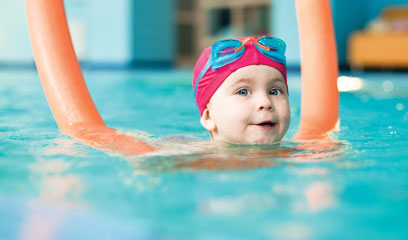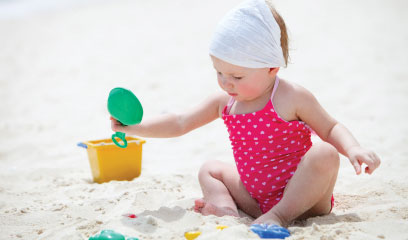 The American Academy of Pediatrics states that children are not developmentally ready for swimming lessons until after their fourth birthday, yet baby swimming classes and toddler swimming classes continue to be extremely popular. Many parents -- and swim instructors -- clearly believe the rewards outweigh any potential risks.
The American Academy of Pediatrics states that children are not developmentally ready for swimming lessons until after their fourth birthday, yet baby swimming classes and toddler swimming classes continue to be extremely popular. Many parents -- and swim instructors -- clearly believe the rewards outweigh any potential risks.
Benefits of baby swimming classes
Linda Riggins, owner of Kirkland-based Linda Riggins Swim Instruction, says the benefits of positive early experiences with water are too many to list. The key, she says, is to make it fun. "Water play, with an emphasis on the word 'play,' is really important," she adds.
Having fun with your baby helps build attachment, self-esteem and trust. "One-on-one interaction with their parents is very important to children," Riggins says, "and in the water is even better because it is face-to-face and skin-on-skin."
Carrie Aull of Kenmore says swimming with her 8-month-old son at Waterbabies Aquatic Program is a great way for them to bond as a family. "Alex loves the water and is doing great," she says. "To him it's just good fun with Mommy and Daddy."
At any age, swimming is also great exercise, resulting in increased strength and greater endurance. Water allows babies to exercise muscles they can't normally use, which helps their motor development, coordination and balance. "I think Alex is learning how to use his body more, working his muscles in different ways," Aull says. "He's learning to hold his breath for short amounts of time. And even at this early stage, he's learning water safety."
Dave Fulmer, a Redmond father of 3-year-old twins, also feels the Waterbabies program has made his boys safer. "As a skydiver, I'm aware that a large percentage of fatalities in any dangerous activity are due to panic," Fulmer says. "The only reliable way to increase the chances that you'll react appropriately in a crisis is through lots and lots of repetition." He says his boys have learned to be relaxed while having respect for water, and have also gained practical water safety skills.
A note of caution on infant swimming
Howard M. Uman, M.D., a pediatrician at Swedish Medical Center, questions the value of these early water skills. "Any limited reflexes or abilities that a small child might develop cannot confer safety without proper supervision," he says. However, he doesn't believe swimming programs are necessarily a disadvantage either. "Developmentally, young children are just not capable of having judgment," he says, "so they really cannot make a reasoned choice about safety."
The American Academy of Pediatrics is also concerned that some early aquatic programs could give parents a false sense of security. In the U.S., drowning is the second leading cause of accidental death and injury among children under age 5, and children between the ages of 1 and 2 are the most likely victims. Aquatic programs for infants and toddlers should not be promoted as a way to decrease drowning risks, the AAP states.
Vera Garibaldi, founder and director of Bellevue-based Waterbabies, agrees. "It is the parents' job to always supervise their children and keep them safe from all hazards, including water," she says. "The only thing that makes children less prone to drowning is constant vigilance."
"No swimming program should ever be called 'drown proofing,'" Linda Riggins adds. "That is a very dangerous thing for parents to believe."
According to Uman of Swedish, there is no specific window of opportunity for children to learn to be comfortable in the water, so parents should not worry or feel pressure about participating in an early swimming program. "Water exposure is not a milestone children need to achieve on any given timetable," he says.
The bottom line: Swimming is healthy fun for most infants and toddlers. Just make sure you follow your child's lead, practice basic water safety guidelines and always maintain focused, arms-length supervision of your child. Then, go get those little feet wet!
Laurie Thompson is a freelance writer from Bellevue. Her children, ages 3 and 5, have been swimming their entire lives and are happiest under the water.
 Infant and toddler swimming tips
Infant and toddler swimming tips
AAP Policy on swimming programs for infants and toddlers
American Red Cross swimming programs and guidesLinda Riggins Swim InstructionWaterbabies Aquatic ProgramYMCA Parent/Child Water Tots
11 Water safety tips for all ages
1. Always supervise your child in and around the water.
2. Pay attention to your child: He or she should feel happy and secure in the water.
3. Before entering any pool or water body, read the signs. Follow all posted rules and be aware of hazards.
4. Ensure that the area offers a clean, safe environment: good water quality, non-slip surfaces, lifeguard, etc.
5. Check water temperature of the pool: 87-94 degrees Fahrenheit is ideal for babies.
6. Don't tire them out: 30 minutes is enough for young children and beginners.
7. Avoid too much sun: Use UV-protective clothing and child-safe sunscreen.
8. Protect the feet: wear flip-flops around the pool and sand shoes at the beach.
9. Drink water to avoid dehydration.
10. Talk to older children about the danger of strangers in public pool or beach settings.
11. Know CPR.









